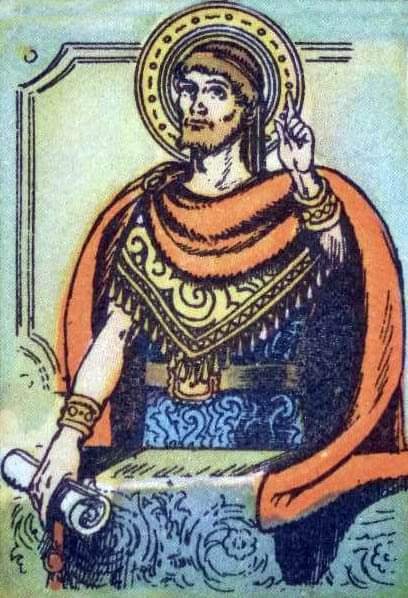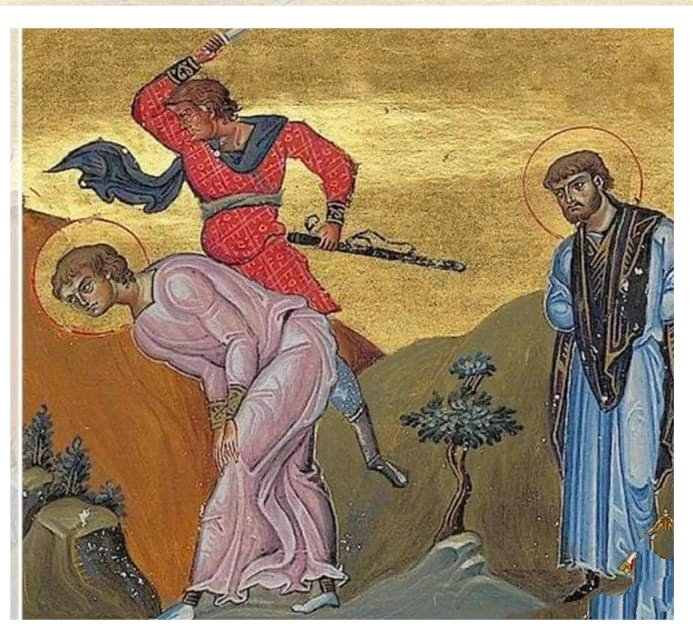
MONTHLY DEVOTIONAL FOR 17th APRIL
April 17, 2023
Titus 2: 11-12
April 18, 2023SAINT APOLLONIUS THE APOLOGIST, MARTYR
FEAST DAY: 18 APRIL
Saint Apollonius the Apologist (died 186), was a Roman Senator and member of the Roman elite. Apollonius had found the truth of Christ, and was unable to deny his faith and confidence in the Lord, earning him a martyr’s death. His heroic defense of the truth, and unwillingness to compromise his beliefs to save himself, is an example and inspiration to both civic leaders and the faithful throughout the world!
Apollonius had spent years in study and was extremely familiar with the major philosophers and schools of thought in the second century Roman empire. He developed an interest in the Jewish scriptures and this led him to Christian writings.

Eventually, Apollonius converted to Christianity because of the witness and testimonies of the early Church members, but continued to study the beliefs and convictions of those he had left behind, hoping to bring them to conversion with himself. As a member of the Roman Senate, he knew well the law forbidding the practice of Christianity.
However, he felt drawn to live a life rich in the grace and love of Christ, and was confident that the Roman rulers would not punish him for this. Apollonius had been baptized, fully embracing his faith. During this period of time, the Emperor Commodus had informally halted the persecution of Christians, out of regard for his Empress Marcia, who was an admirer of the Faith. The laws of his father, Marcus Aurelius, who had persecuted Christians, had not been repealed officially, however.

Therefore, when one of Apollonius’ slaves publicly accused him of being a Christian, he was arrested under the laws of the time. The slave, for his part, was condemned to have his legs broken, and also be put to death, as the anti-Christian laws of Marcus Aurelius also ordered the accusers of Christians to be put to death. Apollonius was brought before the courts to defend himself. As Perennis, the Praetorian prefect who had arrested him, brought Apollonius to his trials he pleaded with him to renounce his faith.
He insisted that if he said the words and apostatized, even if he “didn’t mean it,” those in power were all too willing to find him not guilty of the crime. He reminded Apollonius that the punishment for being a Christian was death and insisted that the right course of action for a senator like Apollonius was to renounce his faith and maintain his influence and power in the world.

Apollonius, of course, refused to renounce his faith before the court, and was led to the Senate to defend himself before his peers. This was the moment that Apollonius had been counting on, and he eloquently testified to his faith before his friends and colleagues.
He ended his great testimony by praying, “O Lord Jesus Christ, give us a bit of your spirit so that we might be helped to obey your teachings to: make peace over anger, join in pity with others and for others, temper our desires, always increase in love, put away our sorrow, cast aside our foolish pride, not love vengeance, and not fear death. Help us to trust our spirit to God the Father who lives and reigns with You and the Holy Spirit now and forever.”
Perennis, as well as his fellow Senators, could not understand why Apollonius wasn’t taking the easy and reasonable way out of death and yelled at him, “Are you determined to die today?” Apollonius responded, “Oh no.” He continued, “I very much enjoy life but my love of life does not make me afraid to lose it. There’s something better waiting for me: eternal life! There is something better given to the person who has lived well on earth.”

Apollonius admonished the listening crowd to cast aside their pride and self-obsession, but they were unwilling to pay the price of faith. He was convicted for his crime not because the senate was willing to convict one of its own but because he was unwilling even to pretend not to trust God. For his crime his legs were crushed and he was beheaded. He died a martyr who had been given a rare chance to preach the Gospel to his executioners.
Saint Apollonius’ Apologia, or defense of the faith, is considered one of the most priceless documents of the early Church. Four separate sources record his historical debate in front of the Roman Senate, including Saint Eusebius and Saint Jerome, as well as Greek and Armenian texts which were discovered late in the 19th century.
The life of Saint Apollonius is a courageous reminder for each of us, that earthly money, power, and prestige pale in comparison to the riches and rewards that await us in heaven.
PRAYER
Lord Jesus, may we, as Saint Peter advised, always be ready to give a defense to everyone who asks us for a reason for the hope that is in us. Help us to speak eloquently of our faith, as St. Apollonius did, remembering also to be charitable. We pray that our faith remain strong in you, Lord Jesus. Amen
(Source: Share Catholic)

Saint Apollonius, pray for us.




